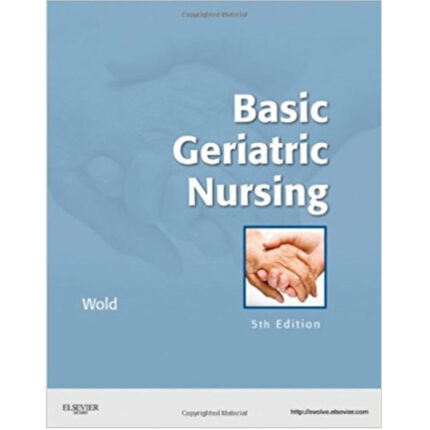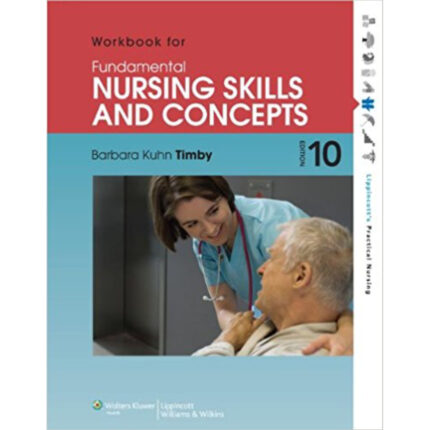Nursing For Wellness in Older Adults 6th Edition by Carol Miller -Test Bank
1. A nurse is leading a word-quiz game with a group of nursing home residents because the nurse knows this activity will assist the residents in maintaining
A) Fluid intelligence
B) Adaptive thinking
C) Crystallized intelligence
D) Psychomotor memory
2. A 69-year-old woman has recently been diagnosed with mild cognitive impairment and has asked the nurse to help her remember things better. Which of the following nursing diagnoses is appropriate for this older adult?
A) Knowledge deficit
B) Altered thought processes
C) Health-seeking behaviors
D) Altered health maintenance
3. A 70-year-old man tells his nurse that he is “worried that I’m losing his mind.” He reports that he has difficulty remembering names as well as he used to, and adds that he has missed two health care appointments in the past month because he forgot about them. The nurse initiates a memory training program for him, although the nurse has been unable to identify any risk factors that might affect the older adult’s cognitive abilities. Which of the following questions is the best approach to evaluating the effectiveness of the memory training program?
A) “Have you seen an improvement in your memory?”
B) “Are you less worried about your memory now?”
C) “How have the memory training techniques helped you?”
D) “Are you using the memory training techniques now?”
4. Which of the following teaching methods is most appropriate for a 1-hour group health education program on nutrition for older adults?
A) Limiting background noise and using a brightly colored Food Guide Pyramid
B) Establishing a learning environment that is challenging and stimulating
C) Giving the participants a handout and allowing them to take notes
D) Using an overhead projector to list nutritional requirements for older adults
5. Which of the following points should the nurse emphasize when educating older adults about memory and cognition?
A) Long-term memory loss is normal.
B) Using calendars, notes, and imagery can help enhance memory.
C) Drinking caffeinated beverages for mental stimulation is a good idea.
D) Having a diminished capacity for learning is an inevitable part of growing older.
6. A 54-year-old woman has brought her father to an appointment at a community clinic because of his increasingly frequent lapses in memory. What assessment question is most likely to identify his potential risk factors for impaired cognitive functioning?
A) “What did your mother and father die of?”
B) “What line of work were you in?”
C) “What medications are you currently taking?”
D) “Where are you currently living?”
7. A 74-year-old man is distraught at the fact that he recently forgot an important appointment as well as lost his wallet. The man has always prided himself in being intelligent, alert, and informed, so even minor lapses in cognition are a source of stress. How should the man’s nurse best interpret these recent deficits in memory?
A) The man is likely experiencing the early stages of Alzheimer disease.
B) The man is likely experiencing a temporary state of delirium that will self-resolve.
C) The man may be experiencing age-related changes in personality.
D) The man may be experiencing benign senescent forgetfulness.
8. A nurse leads a reminiscence session each Monday afternoon at a long-term care facility. Why does storytelling hold the potential for a positive impact on the cognition of older adults?
A) Storytelling is a therapeutic distracter from daily stressors that negatively impact cognition.
B) Creative activities can positively benefit the structure, and thus function, of the brain.
C) Creative arts and storytelling provide accurate assessment data on which appropriate care can be based.
D) Reminiscence therapy promotes social interaction and relieves symptoms of dementia and delirium.
9. A nurse who provides care in a long-term care setting is aware that the cognitive function of older adults does not necessarily decline on an inevitable trajectory. What action has the greatest potential to enhance the cognitive function of residents and prevent cognitive declines?
A) Encourage older adults to openly express their emotions and opinions.
B) Provide residents with four or five low-fat, high-protein meals during the day.
C) Encourage older adults to participate in mentally stimulating activities.
D) Present older adults with numerous opportunities to make autonomous decisions.
10. Mrs. Terence, age 82, lives with a number of health problems, including type 2 diabetes and chronic venous ulcers. Despite these challenges, she has confided in the nurse that she feels more satisfied with her life now than when she was a younger woman. Mrs. Terence is exemplifying what phenomenon?
A) Metamemory
B) The paradox of well-being
C) Crystallized intelligence
D) Neuroplasticity
Answer Key
1. C
2. C
3. C
4. A
5. B
6. C
7. D
8. B
9. C
10. B













Reviews
There are no reviews yet.